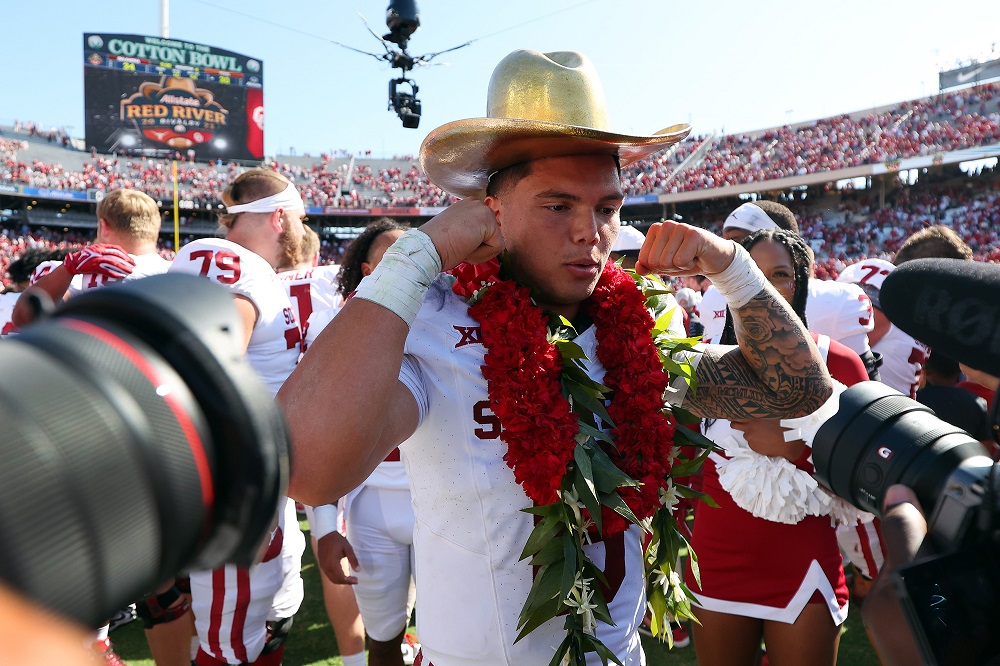
Mike Bianchi
Orlando Sentinel
Why wouldn’t you do what Oklahoma quarterback Dillon Gabriel is doing?
Why wouldn’t you do what Florida running back Trevor Etienne is doing?
Why wouldn’t you do what Ohio State quarterback Kyle McCord and Duke quarterback Riley Leonard are doing?
Why wouldn’t you do what these and many other top stars in college football are doing?
Entering the transfer portal and making themselves a million bucks.
Or two million bucks.
Or however-many-million bucks some desperate big-time institution of higher earning is willing to pay them.
“Make no mistake: a good quarterback in the portal costs $1 million to $1.5 million to $2 million right now,” Nebraska coach Matt Rhule revealed to reporters recently. “There are some teams that have $6-7 million players playing for them.”
Gabriel originally transferred from UCF and wound up at Oklahoma, where he undoubtedly received a lucrative NIL deal. And now he’s transferring again to Oregon where he is likely receiving an even more lucrative NIL deal. Essentially, he’s doing what every smart business person or corporate CEO would do: He’s making the best deal possible and maximizing profits — just like most of us would tell our own sons to do if they were talented college quarterbacks … or running backs … or wide receivers … or offensive linemen.
Why wouldn’t you?
If you’re not, then you’re being financially irresponsible.
Let’s use Gabriel as an example because we are very familiar with him.
He is unquestionably a great college quarterback as he’s shown at both UCF and Oklahoma, but he’s a bit undersized and there are no guarantees his skills will translate to the NFL. If he plays his cards right in the transfer portal — and it appears he has — he could have $3 million, $4 million, $5 million or more in his bank account when he leaves college.
If these high-priced players manage their money correctly, they can set themselves up for life before they even leave college. And, really, isn’t that what college is for — to secure your financial future?
Of course, there is the requisite amount of outrage among some of my old-school college football buddies who lament the lack of loyalty among today’s college players. Easy for them to say. How many of them would turn down a $1 million raise to switch from one company to another in whatever business they’re in?
Could Gabriel have stayed at Oklahoma and still gotten paid? Perhaps, but maybe not as much as he made by becoming a free agent and signing with Oregon, where multi-billionaire Nike founder Phil Knight is a huge financial backer. Throughout my journalism career, the biggest pay raises I ever received didn’t come from my existing employer; they came when I switched from one newspaper to the next.
We don’t know the financial arrangements college players make with their team via the team’s NIL collective, but we do know that many of these collectives (even those at major Power 5 brands) are having issues raising the amount of money needed to keep their existing stars and pay new ones.
Many schools are already finding out that the current model of raising money to pay players through an NIL collective is unsustainable. It’s just not reasonable to ask fans and boosters to ante up millions of dollars every year into perpetuity in order to pay for an entire college football team — especially when there is no tangible return on the investment.
The groundbreaking proposal made earlier this week by NCAA president Charlie Baker makes much more sense. Baker wrote a letter to member institutions proposing a new top-tier subdivision in which NIL compensation would be brought in-house and would require schools to pay athletes directly and with no limits.
Anybody with any common sense knows that a mega-billion-dollar business like college football should be paying for its own labor and not begging fans and boosters to pay for it.
Big 12 commissioner Brett Yormark called Baker’s proposal “directionally correct” earlier this week at the Sports Business Journal’s Intercollegiate Athletic Forum.
In other words, college football administrators — with a giant push from the federal government, state governments, the court system and the athletes themselves — have finally reached the realization that they are going to have to start sharing the wealth with the players.
Players, their parents and their NIL agents aren’t waiting around for the cumbersome NCAA and its plodding bureaucracy to create this new subdivision. Instead, they are already treating college football for what it is — a giant corporation where everybody is trying to make as much money as possible.
If Gabriel can make more at Oregon than he can make at Oklahoma, then I say more power to him. The same goes for Florida’s Etienne, who just entered the portal, and is reportedly garnering interest from Georgia and LSU.
If entire universities can leave one conference for another in their mad dash for more TV money, then why shouldn’t star athletes leave one school for another in their mad dash for NIL money?
For the longest time, we were led to believe that college football’s main mission was to provide educational opportunities for its athletes.
We now know that the pursuit of a college degree has been usurped by the pursuit of corporate profits.
Such is the evolution of college football from an extracurricular activity to a billion-dollar entertainment conglomerate.
As the great economist Milton Friedman once said, “The business of business is business.”
©2023 Orlando Sentinel. Visit orlandosentinel.com. Distributed by Tribune Content Agency, LLC.

